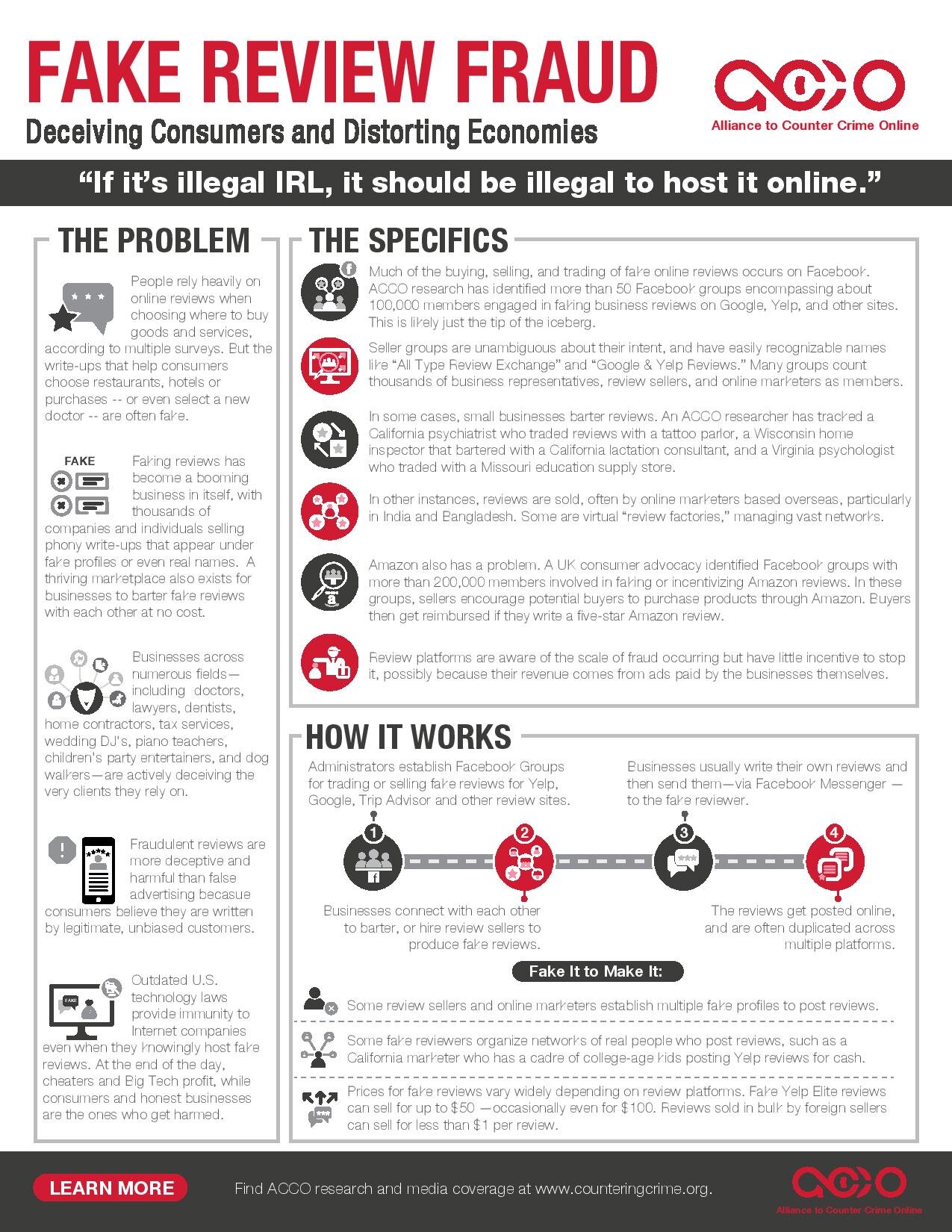Fake Review Fraud: Deceiving Consumers, Harming Honest Businesses, and Distorting Economies



















Probably no other form of online fraud affects more people than fake online reviews. Twenty-first century consumers rely heavily on online reviews in making purchasing decisions, and surveys such as a 2018 Pew study show that American consumers largely trust online reviews. Millions rely on them even for important matters such as which home renovation contractor to hire or which medical specialist to see. But consumers are being duped.
Businesses across all professions—including doctors, dentists, and lawyers—are actively deceiving their very clients through fake online reviews. Fraudulent reviews are more deceptive and harmful than other forms of false advertising because consumers believe they are written by legitimate, unbiased customers.
ACCO Investigator Kathryn Dean has spent over two years combing through online review sites, unearthing fake reviews by thousands of businesses. She has documented some of her research in video format on her YouTube channel, Fake Review Watch. You can also visit her website at FakeReviewWatch.com.
Facebook—Facilitator of Fake Review Fraud
A vast black market in fake reviews thrives on Facebook. Scores of Facebook groups exist for no other purpose than to facilitate review buying, selling, and trading. Groups are easy to recognize by their names. “Google + Review Swap” and “Yelp Review Exchange” are just two of many, some with thousands of members. Dean herself has joined some 60 of these groups encompassing over 100,000 members. Typical posts include, “Build zoom reviews anyone? Also google, Houzz, Angie's list,” and “Google / Yelp review exchange. Please leave a comment or directly message me.” Though Facebook prohibits posts that promote fraudulent reviews, they rarely take action.
Review sellers, many based in India and Bangladesh, abound in these Facebook groups and sell fake reviews in bulk. Other online marketers lurking in these groups form networks of businesses for buying and trading reviews.
Then there's the trading of fake reviews involving all types of businesses. For example, a Virginia psychologist traded with a Missouri educational supply store. A Seattle martial arts studio traded with a Michigan eye surgeon. A California psychiatrist swapped with a Texas credit counseling business. A Los Angeles law firm traded with a home contractor, a children's party rental business, and even a psychic. Career consultants, personal trainers, tattoo artists, barbers, and lactation consultants are all involved in review trading. Businesses often write their own reviews and send them to their trading partners via Facebook private message to post.
Review Platforms Like Yelp and Google Not Serious about Cleaning House
Facebook isn't the only problem. Yelp claims to empower and protect consumers, but fake reviews pervade Yelp. Furthermore, Dean can cite numerous cases in which Yelp has removed some of a business's fake reviews without indicating to consumers that the business is engaged in fraud. Google is even more polluted with fake reviews, which stream in from bulk review sellers in the pay of unscrupulous businesses. Don't think other sites are immune. Tripadvisor, Buildzoom, Houzz, Vitals, Trustpilot, Zillow, the Better Business Bureau, and others are all being gamed. The problem is immense, and these sites have little incentive to clean house; typically, they take advertising dollars from the very businesses reviewed on their sites.
See the Evidence
Yelp Is Hazardous to Your Health Part I
See How Multiple Review Sites Are Gamed
Fake Reviews are Illegal
Fraudulent reviews constitute unfair or deceptive acts or practices that impact commerce in violation of Section 5(a) of the Federal Trade Commission Act. Unfortunately, neither the FTC nor states' attorneys have been aggressive in prosecuting violators. New York prosecuted 19 companies for faking reviews in 2013, calling the practice “the 21st century's version of false advertising,” but such enforcement is rare. In a 2019 FTC case against Sunday Riley Modern Skincare, the FTC's punishment was a wave of the finger even though they found the company had flagrantly faked reviews for two years. Commissioners Rohit Chopra and Rebecca Kelly Slaughter vehemently dissented, arguing, “Fake reviews distort our markets by rewarding bad actors and harming honest companies. The problem is growing, and the Federal Trade Commission should attack it.”
Proposed Legal Reform
ACCO proposes reforming CDA Section 230 to clarify that its protections apply to speech, not illicit commerce. Lawmakers should reform CDA Section 230 to shift the responsibility for monitoring Internet platforms for fraudulent reviews to the tech firms themselves. Laws should regulate that these firms provide evidence of fraudulent activity to law enforcement or regulators. If this reform doesn't occur, fake reviews will continue to skew the marketplace, deceiving millions of consumers and harming honest businesses.
Hear ACCO Investigator Kathryn Dean's Story on Reveal
ACCO Investigator Kathryn Dean herself was the victim of fake review fraud. Hear her story which aired on the Reveal program on National Public Radio here.
Do want tech firms to do more to prevent scams on their platforms? Support our research and advocacy efforts by making a donation!








